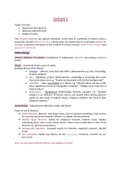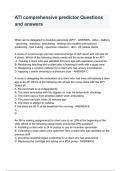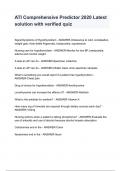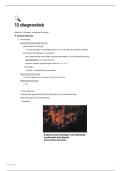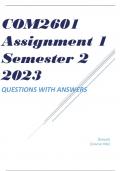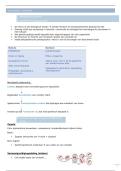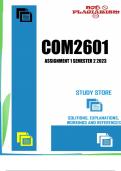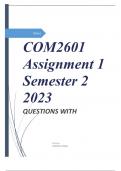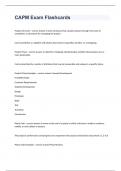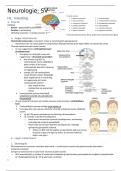Today’s lecture:
➢ theory and the empirical
➢ induction and deduction
➢ empirical cycles
The research question (an explicit statement, in the form of a question, of what it is that a
researcher intends to find out about) determines the superiority of a particular method or
strategy (a general orientation to the conduct of social research: quantitative research and
qualitative research)
Methodology
General objective of science: formulation of explanatory theories concerning empirical
reality
theory - statement about a part of reality
building blocks of the theory:
● concept - abstract term that describes a phenomenon e.g. love, friendship,
student, religion
● law - regularity of facts (observations), something is occurring here more
than somewhere else e.g. “People marry people with similar backgrounds”
● postulate - basic assumption in a theory e.g. “Shared values are one of the
most important factors of homophily in dating”, “Religion is an indicator of
shared values”
● proposition - explanatory relationships between concepts e.g. “Because
religion is an indicator of shared values, and people select dating partners
partly on the basis of shared values, religious students will tend to date
religious students.”
methodology - link between empirical reality and theory
Types of use of theories
➔ grand theories: abstract, very large scope, (try to) explain everything, hard to test,
we can only test some elements of them e.g. capital, division of labour
➔ middle range theories: useful for empirical research, limited scope, explain
something about some social reality, doesn’t have to be transferable to other social
theories e.g. reference group theory
➔ background literature: focussed search for theories, empirical research, limited
scope
➔ fact collection: hardly any theory, ad-hoc (tymczasowy) selection, concrete e.g. our
love survey
How can we reason between theory and empirical reality?
,Induction:
reason from the empirical → theoretical, using limited number of observation to formulate
universal statement about all cases, reasoning from repeated observations
Example: A1 has property P, A2 has property P, A3 has property P, … → All A have property P
This swan is white, this swan is white, this swan is white, … → all swans are white
★ Observation before theory
★ Verification logic: you see something one, two, three, more times so you reason
from this observation and formulate theory
★ Inductive empirical cycle
○ observation before theory: start with
problem (minor problem, huge societal
problem) → observation → based on the
observation you come up with a theory →
evaluation of theory → new questions, new
problems
★ Induction problem: How many observations are
needed to arrive at a valid general statement?
○ Solution I: use falsification logic,
falsification is stronger than verification.
○ Solution 2: use probability (statistics)
Deduction:
reason from theoretical → empirical, we come up with general statements and based on
them we predict our observations
Example: All A have property P → K is an A, K has property P
All swans are white → this is a swan, so it must be white
★ Falsification logic: you formulate the thesis first,
testing theories to be false, not to be true, testing in
many ways
★ Deductive empirical cycle
○ problem → we come up with a theory, we try to
explain it → hypothesis (part of theory,
statement that we can actually test) →
observation → testing → evaluation → new
questions, new problems
Induction ≠ tabula rasa
Tabula rasa - criticism:
1. You can’t leave your positionality, your methodological and theoretical background
behind
2. A-priori assumptions and selection are necessary, because there are too much data,
even formulating a research problem needs some previous knowledge
, 3. Observations are influenced by conscious or unconscious assumptions about certain
facts.
“Complete” perfect empirical cycle: …but in practice it looks more
like this:
, Lecture 2
Today’s lecture:
➢ research question and different forms of research design
➢ general methodological quality criteria
To understand research designs better, we’ll do imaginatory research on Poverty and
Culture of Poverty
research design - framework or structure for collecting and analyzing data influenced by
the kind of research question that is posed and reflecting decisions about the priority being
given to a range of quality criteria
Background: “Culture of poverty”, Oscar Lewis (research in Mexico about poverty in 1950s)
If people live in poverty in generations it does something to them and to these families
Culture of poverty:
❖ marginalized feeling: political and economic apathy “Doesn’t really matter what I do,
I have no influence”
❖ attitude focus on the present: quick gain, even if the longer gain is way more
successful e.g. buying things instead investing in studies
❖ free sexual morals: free relationship forms (living together unmarried), divorces,
matrifocal families (families where the mother was the central figure), at that time it
was shocking
❖ little participation in community and society, when something was organized people
didn’t show up
Culture of poverty doesn’t lead to having new perspectives and → reproduction of poverty
not blaming the poor, but explaining how generations of poverty → to culture of poverty and → to
reproduction of poverty and then it → to another generations of poverty
Causality
→ also here
Causality: what causes what?
E.g. Does poverty causes culture of poverty OR culture of
poverty causes poverty?
Linear causality - A influences B, but B doesn’t influence A.
That is, A causes B.
Circular causality - A influences B, and B influences A. The
circle/dynamic is ongoing.
Experimental design
How can we study/research causality? How can we study cause and effect?
By doing a (field) experiment!
Experimental design: research design that uses manipulation with aim to find causality,
the best one to achieve internal validity. Features: (a) an experimental group, which is
exposed to a treatment, and a control group, which is not, and (b) random assignment of
sample members to the two groups.

